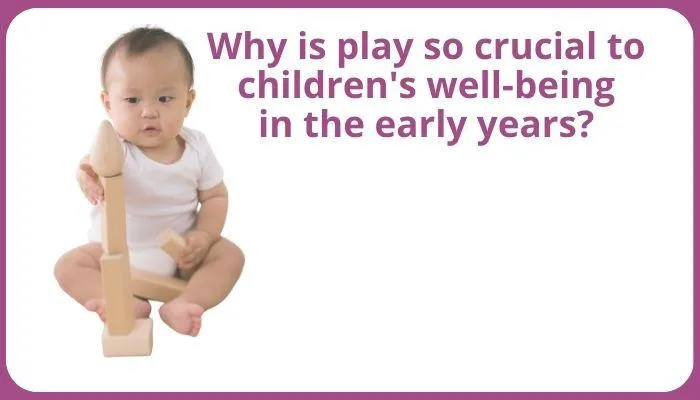Every child's well-being matters.
Types of Abuse Articles
Quick Access
Abuse of Authority
Abuse of Discretion
Abuse of Power
Behavioural Indications
Breast Ironing
County Lines
Cultural Differences (Physical Abuse)
Domestic Abuse
Economic Abuse
Emotional Signs
Exposure to Substance Abuse
Failure to Thrive
Female Genital Mutilation (FGM)
Forced Marriage
Hate Crimes & Targeted Harassment
Impact of Domestic Violence
Impact of Environment
Impact on Development
Institutional Abuse
Isolation
Modern Slavery
Neglect
Online Abuse
Parental Behaviours
Physical Abuse
Radicalisation
Religious Abuse
Restraint
Sexual Abuse
Types of Abuse
Witnessing Domestic Abuse

Why is play so crucial to children's well-being in the early years?
Custom HTML/CSS/JAVASCRIPTPlay is the essential ingredient for cultivating children's intelligence, strength, and happiness. Play is a powerful force, working tirelessly behind the scenes to facilitate remarkable growth and learning.
Firstly, let's explore how play contributes to physical strength. Activities like running, jumping, and climbing during play expend energy and contribute to muscle development and enhanced physical coordination. It's akin to training for a superhero mission, refining skills such as catching a ball or executing cartwheels.
Yet, play is not confined to physical development. It is instrumental in nurturing a supercharged brain. Whether solving puzzles, constructing with blocks, or engaging in imaginative scenarios like a pirate's treasure hunt, play stimulates cognitive processes like a gym workout for the mind. Play fosters problem-solving abilities, ignites imagination, and expands vocabulary.
Consider the impact of play on emotions. The dynamics of playing with friends teach valuable life skills such as sharing, taking turns, and practising kindness. Children learn to empathise with others through role-playing and storytelling, transforming play into a miniature emotional training ground. Furthermore, play is a covert language lesson, as constant communication and interaction with friends enhance communication skills, vocabulary, and accent proficiency.
Whether constructing a fortress from pillows, creating a masterpiece with paint, or inventing an original game, play allows children to unleash their creativity without boundaries.
So, the next time someone suggests ending play in favour of something "serious," remember the profound importance of play. It goes beyond recreation. Play is the key to nurturing brain development, strength, and resilience in children. Embrace play wholeheartedly, for you are investing in developing a future adult with strong mental health.
Quick Access
Abuse of Authority
Abuse of Discretion
Abuse of Power
Behavioural Indications
Breast Ironing
County Lines
Cultural Differences (Physical Abuse)
Domestic Abuse
Economic Abuse
Emotional Signs
Exposure to Substance Abuse
Failure to Thrive
Female Genital Mutilation (FGM)
Forced Marriage
Hate Crimes & Targeted Harassment
Impact of Domestic Violence
Impact of Environment
Impact on Development
Institutional Abuse
Isolation
Modern Slavery
Neglect
Online Abuse
Parental Behaviours
Physical Abuse
Radicalisation
Religious Abuse
Restraint
Sexual Abuse
Types of Abuse
Witnessing Domestic Abuse

Why is play so crucial to children's well-being in the early years?
Custom HTML/CSS/JAVASCRIPTPlay is the essential ingredient for cultivating children's intelligence, strength, and happiness. Play is a powerful force, working tirelessly behind the scenes to facilitate remarkable growth and learning.
Firstly, let's explore how play contributes to physical strength. Activities like running, jumping, and climbing during play expend energy and contribute to muscle development and enhanced physical coordination. It's akin to training for a superhero mission, refining skills such as catching a ball or executing cartwheels.
Yet, play is not confined to physical development. It is instrumental in nurturing a supercharged brain. Whether solving puzzles, constructing with blocks, or engaging in imaginative scenarios like a pirate's treasure hunt, play stimulates cognitive processes like a gym workout for the mind. Play fosters problem-solving abilities, ignites imagination, and expands vocabulary.
Consider the impact of play on emotions. The dynamics of playing with friends teach valuable life skills such as sharing, taking turns, and practising kindness. Children learn to empathise with others through role-playing and storytelling, transforming play into a miniature emotional training ground. Furthermore, play is a covert language lesson, as constant communication and interaction with friends enhance communication skills, vocabulary, and accent proficiency.
Whether constructing a fortress from pillows, creating a masterpiece with paint, or inventing an original game, play allows children to unleash their creativity without boundaries.
So, the next time someone suggests ending play in favour of something "serious," remember the profound importance of play. It goes beyond recreation. Play is the key to nurturing brain development, strength, and resilience in children. Embrace play wholeheartedly, for you are investing in developing a future adult with strong mental health.

Why is play so crucial to children's well-being in the early years?
Custom HTML/CSS/JAVASCRIPTPlay is the essential ingredient for cultivating children's intelligence, strength, and happiness. Play is a powerful force, working tirelessly behind the scenes to facilitate remarkable growth and learning.
Firstly, let's explore how play contributes to physical strength. Activities like running, jumping, and climbing during play expend energy and contribute to muscle development and enhanced physical coordination. It's akin to training for a superhero mission, refining skills such as catching a ball or executing cartwheels.
Yet, play is not confined to physical development. It is instrumental in nurturing a supercharged brain. Whether solving puzzles, constructing with blocks, or engaging in imaginative scenarios like a pirate's treasure hunt, play stimulates cognitive processes like a gym workout for the mind. Play fosters problem-solving abilities, ignites imagination, and expands vocabulary.
Consider the impact of play on emotions. The dynamics of playing with friends teach valuable life skills such as sharing, taking turns, and practising kindness. Children learn to empathise with others through role-playing and storytelling, transforming play into a miniature emotional training ground. Furthermore, play is a covert language lesson, as constant communication and interaction with friends enhance communication skills, vocabulary, and accent proficiency.
Whether constructing a fortress from pillows, creating a masterpiece with paint, or inventing an original game, play allows children to unleash their creativity without boundaries.
So, the next time someone suggests ending play in favour of something "serious," remember the profound importance of play. It goes beyond recreation. Play is the key to nurturing brain development, strength, and resilience in children. Embrace play wholeheartedly, for you are investing in developing a future adult with strong mental health.
Quality Early Years Ltd.,
Dickens House,
Guithavon Street,
Witham, Essex,
England, CM8 1BJ
© Quality Early Years Ltd 2025

Find On the Button
on Social Media

